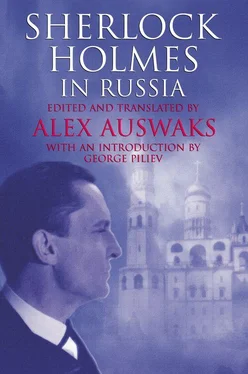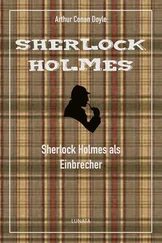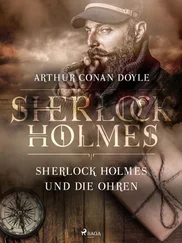‘Take ’em!’ shouted Zviagin and rushed forward. The robbers were tied up in no time.
‘God help us!’ suddenly a desperate cry burst from Holmes. We turned to look at him. He was moving like lightning towards the entrance to the underground warehouse. He got as far as some object lying on the ground when there was the sound of a blow and we saw Holmes, his face distorted, dragging an unconscious Bakhtadian away.
‘What’s happened?’ I asked in alarm.
‘A few more seconds and this villain would have blown himself up and us with him,’ answered Holmes. ‘We paid no attention to him because he was wounded. He realized there was no escape, so he gathered up all his strength, dragged himself to the spot where there is a fuse coming from a mine inside the wall. I seized him just as he lit the match to light the Bickford cord. Just as well I got to him in time to prevent him blowing us all to kingdom come!’
The wounded groaned in pain.
Out of my pocket I took bandages and my campaign first aid kit with all the items needed for caring for the wounded and began to tend to them.
We left men to guard the gang and the three of us, with two gendarmes, went to examine the underground storage chamber. The entrance was a first-class piece of workmanship. It was made up of four large stone slabs. They were fixed into a thick iron frame so skilfully that the closest scrutiny couldn’t distinguish them from the tunnel walls. Once through them, we were in a vast underground grotto carved out of the rock.
The grotto was lit up by ten bright lamps, whose light fell on mountains of chests filled with the most varied goods. In one corner there was a small office desk with a thick notebook on it. Entered up in it with absolute precision were the supply and delivery of goods, with notes indicating from whom delivered and to whom sold.
‘This is all we need,’ said Holmes, taking the book. He turned to Zviagin, ‘I’ve done my job. Here is a list of all those mixed up in this business. One hundred and ninety-two major figures and, as for small fry, probably ten times more.’
Zviagin took the list and with a frown began to scan it, ‘These are VIPs,’ he said, looking troubled and confused. ‘How does one get to them?’ He fell silent.
Holmes looked at him ironically. ‘The root of the evil must be sought at the top of a rotten bureaucracy for which some little man is usually made to carry the blame. If in all seriousness you wish to get rid of this evil, you will only be saved by a just and correct Parliamentary system.’
‘And that’s already not up to me,’ said Zviagin coldly.
‘But, surely, the fact that such people participate in such matters proves the necessity for public control by the people and not bureaucratic control out of which these people emerged,’ Holmes persisted.
‘I would ask you not to say such things in the presence of lower ranks,’ Zviagin interrupted him curtly and added, ‘Our job is done. The sentries are in place. We can go.’
We came out, got aboard the train waiting near the tunnel and ordered ourselves to be taken back.
Several years have passed since then. We read the accounts of trials. We knew that the case brought to trial was subject to considerable alteration. Many, many were brought to book, but it was the small fry who paid the price, plus a few secondary officials in various departments.
The First and the Second Governmental Dumas, the Russian attempt at a Parliament, were dissolved before either could get to the happenings in Siberia and Manchuria. The Third Governmental Duma was so overwhelmed with legislation and so occupied with good intentions, that it had absolutely no time for Siberia.
3. THE STRANGLER
P. Nikitin
Sherlock Holmes was reading the papers when I came into his hotel room. Seeing me, he put aside the newspaper he was reading and said, ‘In the sort of life we lead, either we are asked to do something or, for some reason or another, we do it of our own accord.’
‘You are speaking of—’ I prompted.
‘I am speaking of our profession. More often than not, we are approached for assistance by others, but there are times when something crops up and investigating it is a positive joy, despite the fact that nobody has asked us to look into the matter.’
‘Do I take it that you’ve found something interesting in the papers today?’ I asked.
‘You are absolutely right, Watson,’ Holmes answered. ‘Today’s papers are full of a particularly mysterious crime committed yesterday not far from Moscow and, if you are interested, let me read you one of the accounts of it.’
‘But, of course,’ I answered. ‘You know perfectly well that I am always interested in anything that interests you and you would be doing me a great favour if you were to read to me whatever it is that could intrigue you so much.’
Instead of answering, Holmes picked up one of the newspapers and, finding the required item, began to read out aloud.
‘Last night, 25 May, at 11 o’clock in the evening, the police began to investigate a highly mysterious crime which took place near Moscow on the estate of a member of the gentry, Sergey Sergeyevitch Kartzeff.
‘At three o’clock in the afternoon, Sergey Sergeyevitch Kartzeff locked himself in his bedroom to rest, as he always did after having dined at home. Normally, his valet would wake him by knocking on the door after a couple of hours. This time, despite several attempts by the valet, there was no answer. Surprised at his master’s failure to respond, the valet knocked harder, but there was still no response. The valet now became anxious, ran to fetch the cook and maid, and all three of them began to beat on the door, but there was still no response. Fearing that something untoward might have occurred, they broke it down and found Sergey Sergeyevitch Kartzeff dead. He was lying in his bed, his eyes bursting out of their sockets and his face blue. The district police and an investigator were immediately sent for and on arrival at the scene of the crime pronounced that Sergey Sergeyevitch had been strangled to death. A close inspection of the scene yielded only contradictory and incomprehensible results. First, it was established that at the time the crime was committed, the room was locked from the inside, though the lock was damaged because the staff had had to use force to break in. The window had been sealed for the winter and only a hinged pane in it could be opened, so small that a seven-year-old child could hardly squeeze through it. The room was on the second floor, and it had no other openings or apertures, even through the stove. Nevertheless, the old man’s throat showed clear traces of a strangler’s unusually long fingers. The face of the dead man was severely scratched in several places. An examination of the window, the windowsill and the ground beneath the window showed absolutely no clues of any sort. This might have been caused by a light drizzle which had been falling that day and most probably washed away all traces. The whole house stands in its own grounds. All that the investigators found were several strange traces on the wall outside of the room in which the corpse was found. These traces, most probably, belonged to some freak of nature whose fingers were inordinately long and left such strange prints. The staff were asked whether anyone in the house had deformed feet, but they all declared there never had been anyone like that. The investigators cross-examined the entire staff. Old man Kartzeff was a bit of a recluse, they said, enjoyed managing the estate, seldom received guests, visited neighbouring landowners and got along with everyone. He treated peasants and workers kindly, which ruled out revenge as a motive. Moreover, there is one other circumstance pointing to robbery as a motive. A drawer of the dead man’s desk was open and there were many papers and objects strewn all over the floor as if in haste. Asked by the investigators who had recently visited the deceased, the servants testified that since the end of winter there had only been two visitors. One was his nephew, Boris Nikolayevitch Kartzeff, who lived on his own small estate, Igralino, not too far away, and another nephew, Nikolai Nikolayevitch Kartzeff, brother of Boris, had dropped in a couple of times. The latter was by no means a rich man and occupied himself with some sort of private business in Moscow. Further inquiries established that both nephews had each spent the night in his own home. Thus the investigation has produced no results and it seems that catching the perpetrator will be no easy matter.’
Читать дальше












